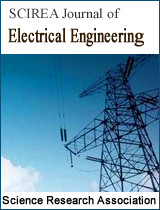BER Performance Degradation of a Powerline Communication System due to Power Transformer and Performance Improvement by Diversity Reception Technique
DOI: 279 Downloads 16737 Views
Author(s)
Abstract
In powerline communication, both the RF data and low frequency electric power flow through the same line. Where the power-line is actually designed for the transmission and distribution of electrical power. Therefore, the cables/wires are so chosen as suitable for the use of high voltages at low frequencies. But RF transmission requirement is low voltages at higher frequencies. So, the transmission channel for RF signal finds some unfavourable factors in the channel such as, high attenuation, isolation of transformer, varying impedance, noise, etc. These factors lead to low data rates, which tend to limit its performance for applications like home automation or monitoring. A power transformer used in a PLC line intended to handle the power transformation of the power line of very low frequency. But when a RF PLC signal is applied to the line its behavior and response to RF frequencies will be different from its response to power frequencies. At the power frequency, all power lines are electrically short in terms of wavelength. At RF carrier frequencies, however, most lines are many wavelengths long because of the much shorter wavelength. In this paper, an analytical approach made to investigate the behavior of a power transformer used in a PLC system and find out the losses of RF signal due to the presence of a transformer, and mitigate the same using diversity reception.
Keywords
OFDM, Diversity reception, Transfer function
Cite this paper
M Mahbubur Rahman, S P Majumder,
BER Performance Degradation of a Powerline Communication System due to Power Transformer and Performance Improvement by Diversity Reception Technique
, SCIREA Journal of Electrical Engineering.
Volume 4, Issue 1, February 2019 | PP. 10-24.
References
| [ 1 ] | S. Tachikawa, H. Hokari and G. Marubayashi,”Power line data transmission,” IEICE Technical report, SSTA89-7, March 1989. |
| [ 2 ] | T.V.Prasad, S.Srikanth, C.N.Krishnan, P.V.Ramakrishna, “Wideband Characterization of Low Voltage outdoor Powerline Communication Channels in India”, AU-KBC Centre for Internet and Telecom Technologies Anna University, M.I.T. Campus,Chennai, India. |
| [ 3 ] | Holger Philipps, “Performance measurements of powerline channels at high frequencies” Research paper of Institute for Communications Technology, Braunschweig Technical University, Schleinitzstrasse -22, D-38106 Braunschweig, Germany, PLC’98. |
| [ 4 ] | Abdelali Rennane, Christophe Konaté and Mohamed Machmoum, “A Simplified Deterministic Approach to accurate Modeling of Transfer Function for the Broadband Power Line Communication” New, 2 Advanced Technologies journal, Nantes of University (Nantes), France, www.intechopen.com. |
| [ 5 ] | Batuhan Danisman, “Analysis of conventional low voltage power line communication methods for automatic meter reading and the classification and experimental verification of noise types for low voltage power line communication network” Thesis for master of science in electrical and electronics engineering, Graduate School of Natural and Applied Sciences, February 2009. |
| [ 6 ] | Hasan Basri Çelebi, “Noise and multipath characteristics of power line communication channels” Thesis for master of science in Electrical Engineering Department of Electrical Engineering College of Engineering, University of South Florida, 30 March, 2010. |
| [ 7 ] | Olaf G. Hooijenl and A.J. Han Vinck, “On the Channel Capacity of a European-style Residential Power Circuit” ' Signaal Communications, Institute for Experimental Mathematics, University of Essen, ~llernstr&se 29, 45326 Essen, Gennany. |
| [ 8 ] | M. Zimmermann and K. Dostert, “Analysis and modeling of impulsive noise in broad-band powerline communications,” IEEE Trans. Electromagn.Compat., vol. EMC-44, no. 1, pp. 249–258, Feb. 2002. |
| [ 9 ] | M. Rahman M and Majumder S. P “Analysis of a powerline communication system over a non-white additive Gaussian noise channel and performance improvement using diversity reception ”Network and Communication Technologies journal Vol. 1, No. 1; June 2012. |
| [ 10 ] | Manfred Zimmerman and Klaus Dostert “A multipath model for the powerline channel” IEEE transaction on communications, vol. 50, No. 4, April 2002. |
| [ 11 ] | P A. JANSE VAN RENSBURG "Effective coupling for power line communications" D. Ing (Electrical and Electronics), University of Johannesburg, Jan 2008. |
| [ 12 ] | Marcel Nassar, Jing Lin, Yousof Mortazavi, Anand Dabak. Han Kim, and Brian L. Evans, “Local Utility Powerline Communications in the 3-500 kHz Band: Channel Impairments, Noise, and Standards” IEEE SIGNAL PROCESSING MAGAZINE 1, January 20, 2012. |

